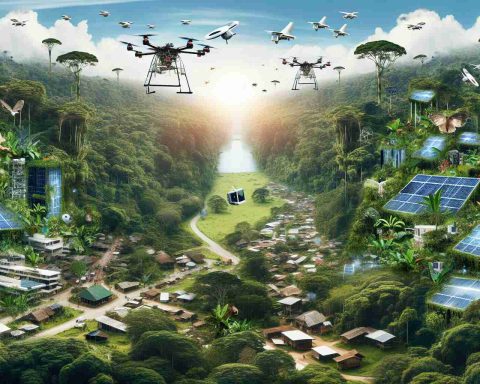In a revolutionary move, a global furniture and interior design conglomerate is embracing state-of-the-art technologies to streamline their warehouse operations. Drones equipped with artificial intelligence are set to revolutionize inventory management and ease the workload on employees across distribution centers in Europe and the United States, as reported by Retail Detail.
The drones deployed by the Ikea conglomerate utilize an AI-based algorithm for constant identification and imaging of storage locations round the clock. Specifically designed to operate in enclosed spaces, these drones feature obstacle detection capabilities to avoid collisions and meet workplace safety standards. The GPS system algorithm integrated into these devices is developed by the Swiss company Verity.
Successful trials of these drones with the new software were conducted overnight in self-service areas at Belgian stores and distribution centers. The new system will now be gradually implemented across Europe and North America.
Currently, Ikea “employs” over 250 drones in 73 locations spanning nine countries. These cutting-edge devices alleviate employees from time-consuming and physically demanding tasks, ensuring faster and more precise warehouse resource management.
Drones offer a multitude of benefits by simplifying logistics operations, enhancing inventory integrity, and consequently enabling the provision of even higher levels of service to customers, explained Claes Lindgren, Global Head of Logistics Service Category.
The integration of drones in warehouse management marks a significant shift towards efficiency and innovation in the logistics industry. As this technological advancement gains traction, several critical questions come to mind:
1. How do drones impact overall operational efficiency in warehouse management?
Drones revolutionize warehouse operations by streamlining inventory management, improving accuracy, and increasing the speed of tasks traditionally performed by humans.
2. What are the key challenges associated with implementing drones in warehouse environments?
One major challenge is the initial investment required for drone technology adoption, including training employees to work alongside these autonomous devices and ensuring their seamless integration into existing systems.
3. Are there any controversies surrounding the use of drones in warehouse management?
Controversies may arise regarding privacy concerns related to the surveillance capabilities of drones, as well as potential job displacement due to automation reducing the need for human labor in certain aspects of warehouse operations.
Advantages of using drones in warehouse management:
– Enhanced operational efficiency through automation of routine tasks
– Improved accuracy in inventory tracking and management
– Increased safety for employees by offloading physically demanding or hazardous activities to drones
– Faster response times and greater flexibility in fulfilling customer orders
Disadvantages of integrating drones into warehouse operations:
– High initial investment costs for acquiring and implementing drone technology
– Potential job displacement as automation reduces the need for manual labor
– Regulatory challenges and compliance issues related to drone operations in different regions
– Security risks associated with the use of drones for surveillance and data collection
Overall, the widespread adoption of drones in warehouse management signifies a new era of innovation and optimization in the supply chain industry. As companies continue to explore the potential of autonomous technologies, it is crucial to address challenges, mitigate risks, and capitalize on the numerous benefits that drones bring to modern logistics operations.
For more information on the latest trends in warehouse technology and supply chain management, visit Retail Detail.

















